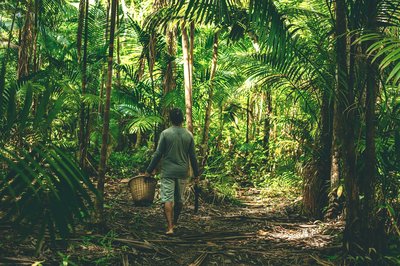
/ Natura &Co Latin America / Infrastructure and the value chain / Development of suppliers
Development
of suppliers
GRI 2-6, 2-23, 2-24, 2-29, 3-3, 413-1, 414-1
Our production ecosystem is notable for its interdependence. We have an extensive network of suppliers working in the logistics processes, production of raw materials, sales, services, technology and infrastructure.
We have a robust model of engagement and development together with the sociobiodiversity supplier communities, as well as with the other partners within the value chain.
The engagement of the business partners is essential to the execution of the strategy and fulfillment of our sustainability objectives.
The main policies regarding this issue are summarized in the Suppliers’ Code of Conduct, the Global Procurement Policy and the Natura &Co Declaration of Human Rights. In these policies, we have defined the risks and opportunities involved in our entire supply structure, including rural and factory workers, community members, temporary employees, indigenous peoples and minority groups. Over recent years, we have also focused our work on the total traceability of our critical chains and on involving the suppliers in tackling climate change and the loss of biodiversity.
In 2024, we negotiated with 7,730 suppliers, 0.84% more than the 7,665 suppliers we dealt with during the previous year. We disbursed a total of BRL 12.9 billion in purchases (against BRL 13.8 billion in 2023), with 41.6% going to direct suppliers and 58.4% to indirect suppliers. Around 80% of the sum was spent on a group of 335 suppliers carrying greater financial weight. Specifically in relation to our raw materials, there are 94 socio-biodiversity chains in the Amazon region that supply us with more than 40 essential active ingredients for the creation of our products. We recently extended our bioactives supply chains to the Peruvian and Colombian Amazon regions (read more in the Climate, Biodiversity and Nature chapter).
GRI 2-6
Natura has a robust model of engagement and development in place with the raw material supplier communities, with 100% of the operations having implemented specific evaluations and program designed to strengthen the socio-biodiversity. The evaluations, both social and environmental, are participative and published.
In order to define those partners which we consider to be strategic, we take into account criteria relating to innovation, sustainability and risk. We also undertake an annual satisfaction survey to obtain a better idea of the quality of our relations. As well as the evaluation of risks related to a corruption, ethics, integrity and human rights, we aim to create opportunities, specifically by contributing to our suppliers’ ability to progress, bring about socioeconomic benefits in their regions, and adopt socioeconomic practices aligned with the concepts of sustainability and regeneration.
4 years of history centered on 6 pillars:
- Quality
- Information
- Innovation
- Competitiveness
- Capability and skills
- Commitment to Life
Embrace Program
Embrace Program
GRI 3-3
Also focused on the development of the chain, we have been operating the ‘Embrace’ program for four years now, which recognizes and encourages the adoption of sustainability practices by the suppliers. Embrace uses a tool to continually monitor the suppliers, and includes six pillars: Quality, Service, Innovation, Competitiveness, Capability and Skill, and Commitment to Life.
In 2024, we began increasing the diversity of the suppliers in our value chain to include companies in different locations, of different sizes and with different profiles. To do so, we simplified the onboarding process, thereby allowing micro and small companies to join us as partners.
Local prioritization
GRI 204-1
In 2024, 44.5% of our (Natura and Avon) sourcing for the most important units [Cajamar and Benevides (Brazil), Moreno (Argentina) and Celaya (Mexico)] was made through local suppliers, or in other words, those located within 80 km of the operation1. We aim to strengthen our ties with local suppliers, especially those involved in the acquisition of bio-ingredients from the Amazon region for Natura products. This forms part of our commitment to sustainable development and the regional economy.
Agribusiness in partnership with Aprocamp
In 2024, we inaugurated an essential oils agribusiness in partnership with the Campo Limpo community, in Santo Antônio do Tauá, in the Brazilian state of Pará. The initiative was created and guided by Natura in partnership with the Campo Limpo Community Farmers Association (Aprocamp). Natura’s investments allow for the acquisition of equipment used to extract and process the oils.
Aprocamp has been supplying Natura with plant-based raw-materials since 2003. The Association sells plants such as Pataqueira, Estoraque, Priprioca, and Capitiu, and is responsible for supplying 70% of the raw materials sourced from the Amazon region used in the brand’s portfolio of perfumes. Before the factory was inaugurated, the extraction of essential oils, the stage involving the highest aggregate value, was performed by third parties.
Inauguration of the first essential oils agribusiness in partnership with Aprocamp
After the opening of the agribusiness unit, however, the community assumed responsibility for this manufacturing process, meaning a significant rise in the aggregate value of the commercialized products. This has enabled the creation of new work opportunities in the socio-biodiversity chains. It is estimated that the gross income should rise by 60% and the number of workers in the area of production of Natura supplies should rise from 75 to 100. It is expected that around 150 tons of raw plant-based material will be processed.
Pennyroyal Agribusiness
The Pennyroyal Agribusiness Expansion Project, realized in partnership with the GF Poejo supplier group, located in Campestre da Serra, in Brazil, is aimed at increasing the production of pennyroyal essential oil to meet our growing demand for this input. This agribusiness, founded in 2022, has undergone structural and operational expansion, including the installation of new equipment and training of the local team.
GRI 203-1
Footnotes:
As per criteria for the B Corp Certification.
